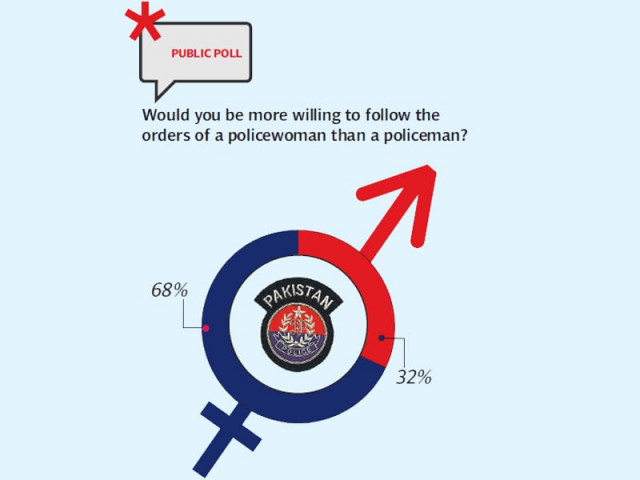For women police, glaring disparity in rural, urban mindsets
Amid heated discussions, law enforcers highlight the need to bring female officers to the forefront.

Contrary to popular belief, the policemen in rural Sindh are more open to have women police officers as against the people of Karachi.
The discussions on Women Police Reforms held at a hotel on Monday often turned up the heat when policewomen were accused of not coming out of their comfort zone or not being professional enough. But the participants at the event, organised by Individualland, agreed at least on one point: it is time to bring female police officers to the front and to introduce them to real policing.
At the seminar, a survey titled “Public Perception of Women Police in Pakistan” was revealed about what the masses think about policewomen. In Karachi, around 109 people were interviewed. Sixty-six per cent said they would not allow their sisters or daughters to join the police force. However, a whopping 77 per cent thought that policing was appropriate for Pakistani women.
In contrast, 91 per cent of the male police officers said they would encourage their women to join the police force In Sindh. The results were of another survey “Male Police Perception of Women Police in Pakistan” for which 97 male police personnel were interviewed.
A good majority, 92 per cent said that there should be reserved quota for women in police but 94 per cent believed that their training did not differ from females. Contrary to common belief, 94 per cent said that they were willing to serve under a female officer and 86 replied in the negative when asked if women should only be handling female cases.
Heated discussions
When Ashfaq Khan, a senior policeman, commented on how women officers do not come to work and stay at home, it left the females in the hall fuming. A female police officer, Aamina Sultana, snapped: “What do you have to say about the male police officers who just come to the police station to mark their attendance.”
“Come with us in the field and see the conditions in which we work,” another, Mariam Qazi, retorted. The meeting was attended by six women police officers, who complained of discrimination in training. “Why are we not sent on peacekeeping missions,” one of them complained. “Opportunities should be given to those serious about their profession,” added another.
While Niaz Ahmed Siddiqui stressed that there were no differences in training of male and female officers, Aamina Sultana, who works in the Sindh inspector general’s office, narrated an incident: “When I was once sent for training to rural Sindh, the men told me to step aside. They said being a woman, I didn’t need to train.”
Woman police officers should be present at every police station, felt Sindh’s former Inspector General Niaz Ahmed Siddiqui. “They should be active and accessible everywhere.”
He recommended that issues of domestic violence and sexual harassment at workplace should be exclusively investigated by women. The women protection laws demand the role of women in policing.
Additional Inspector General Ashfaq Khan pushed for women to be granted greater authorities and responsibilities. He cited an example of a woman station house officer in Badin, who bravely fought criminals and turned things around.
“Why can’t a woman become the SHO of the Defence police station? Why can’t they be made DSPs, SSPs or SHOs,” Ashfaq Khan asked, adding that regular police stations exceeded 100 in Karachi but no woman is the in charge there.
Sharing the highlights of a recent survey, the director of Individualland, Gulmina Bilal Ahmad, informed the participants that there were only 19 women police stations across the country. In Karachi alone, there are 233 woman officers out of whom 81 are posted with the DIG South Zone, 65 with the DIG East Zone and 41 with the DIG West Zone. Nineteen policewomen are stationed at the three woman police stations, while 21 officers are posted at the DIG Traffic office.
Published in The Express Tribune, October 9th, 2012.



















COMMENTS
Comments are moderated and generally will be posted if they are on-topic and not abusive.
For more information, please see our Comments FAQ